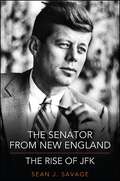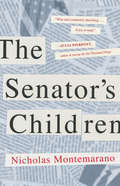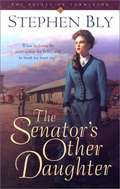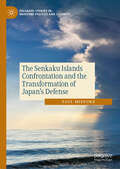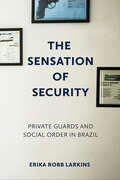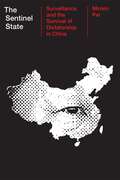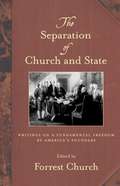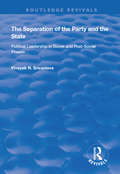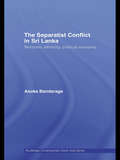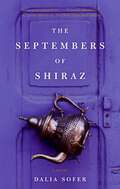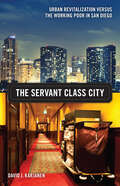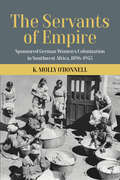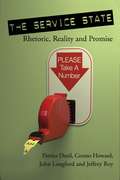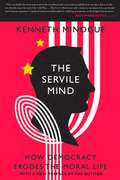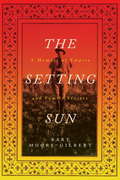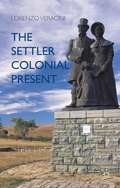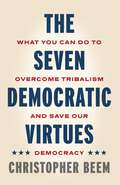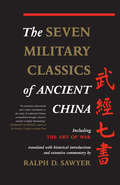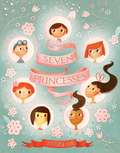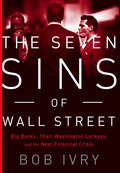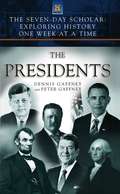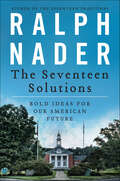- Table View
- List View
The Senator from New England: The Rise of JFK (Excelsior Editions)
by Sean J. SavageGold Winner for Political Science, 2015 Foreword Reviews INDIEFAB Book of the Year AwardsJohn F. Kennedy's path to the presidency began during his eight years of service in the United States Senate. In The Senator from New England, Sean J. Savage contends that Kennedy initially pursued a centrist, bipartisan course in his rhetoric and policy behavior regarding the regional policy interests of New England. Following his narrow defeat for the Democratic vice presidential nomination in 1956 and his nationwide speaking campaign for Adlai Stevenson, JFK's rhetoric and policy behavior became more partisan and liberal, especially during the 1958 midterm elections. While JFK claimed that he still protected and promoted the policy interests of New England on a bipartisan basis, he used his speaking engagements to interact with Democratic politicians throughout New England in an effort to secure the entire region's delegate votes at the 1960 Democratic National Convention. Based on the use of primary sources, archives, and special collections from four presidential libraries, the Library of Congress, Boston College, the Margaret Chase Smith Library, the Massachusetts Historical Society, and other institutions, The Senator from New England provides an unrivaled glimpse into Kennedy's Senate career and early presidential campaign strategy.
The Senator's Children
by Nicholas Montemarano"It's hard to look so deeply into other people's lives that you really understand them, except perhaps through fiction, and that is what Montemarano has done here, with deftness and subtlety." —The New York Times In a country that loves second chances, are some transgressions simply unforgivable? Sisters Betsy and Avery have never met, but they have both spent their lives under the scrutiny of prying cameras and tabloid journalists. Their father, David Christie, was a charismatic senator and promising presidential candidate until infidelity destroyed his campaign and his family’s life. In the aftermath, Betsy grieves her broken family, while Avery struggles with growing up estranged from her infamous father yet still exposed by the national spotlight. Years later, as David’s health declines, Betsy and Avery are forced to face their complicated feelings about him—and about each other. With delicacy and empathy, Nicholas Montemarano brings these sisters together in a parallel of grief and grace.The Senator’s Children brilliantly distills the American family under pressure.
The Senator's Daughter
by Sophia SassonHe can play the game, but she'll make the rules Political science professor Kat Driscoll will not be "handled" by anyone. Certainly not by Alex Santiago, the suave, savvy and handsome campaign manager for Senator Roberts, the man recently revealed to be her father. Alex clearly sees the sudden revelation of his candidate's long-lost daughter as an unfortunate glitch in their race for reelection. One that needs to be carefully spun and managed. But Kat isn't about to play along, or comply with Alex's ridiculous attempts to make her more media friendly. He'll have to deal with the real Kat. And maybe, in the process, she can discover the real Alex...
The Senator's Other Daughter (The Belles of Lordsburg #1)
by Stephen BlyWithin the locket hanging near her heart is the secret that's broken it. A life of peace and seclusion as the unknown Miss Denison. It's what Grace longed for even before her father banished her from Washington, D.C. She just may have found it in Lordsburg, New Mexico--the small railroad town where people hide until the world stops looking. A place to send black sheep, skeletons in the closet, rebellious sons ... and wayward daughters whose secrets could ruin a father's precious political career. Yet Grace's cherished anonymity is soon lost when she gets caught in the middle of a huge ruckus. And her life is anything but peaceful thanks to an ornery pet at her boarding house, a precocious young Mexican boy, and a cowboy who makes her want to run to him and from him at the same time. When he learns the secret within her locket, will he break her heart too?
The Senkaku Islands Confrontation and the Transformation of Japan’s Defense (Palgrave Studies in Maritime Politics and Security)
by Paul MidfordThis book argues that the transformation of Japan’s defense since 2012 has been triggered by the emergence of the first threat to Japan’s territorial integrity since 1945, namely China’s continual challenging of Japan’s control of the Senkaku Islands. It shows how this threat led to Japan building its own version of an A2/AD strategy and contributed to the demise of the prohibition on not procuring long-range missiles. It argues that the new security documents of 2022 that mandate increasing defense spending to 2% of GDP, is the culmination of this Senkaku-driven post-2012 defense transformation. Nonetheless, Japan’s defense transformation faces significant challenges, including geographic and demographic, base-community relations, and limited SDF capacity. This book analyzes the implications of Japan’s defense transformation for its involvement in a military conflict over Taiwan between China and the USA. It argues that the attitudinal defensive realism of the Japanese public and many elites explain why the confrontation over the small and remote Senkaku islands led to a transformation of Japanese defense, and why this transformation has been limited to territorial defense and is not leading Japan to play a military role beyond its borders.
The Sensation of Security: Private Guards and Social Order in Brazil (Police/Worlds: Studies in Security, Crime, and Governance)
by Erika Robb LarkinsThe Sensation of Security explores how private security guards are a permanent, conspicuous fixture of everyday life in the Brazilian city of Rio de Janeiro. Drawing on long-term ethnographic research with security laborers, managers, company owners, and elite global consultants, Erika Robb Larkins examines the provision of security in Rio from the perspective of security personnel, providing an analysis of the racialized logics that underpin the ongoing work of securing the city. Larkins shows how guards communicate a sensação de segurança (a sensation of security) to clients and customers who have the capital to pay for it. Cultivated through performances by security laborers, the sensation of security is a set of culturally shaped racialized and gendered impressions related to safety, order, well-being, and cleanliness. While the sensação de segurança indexes an outward-facing task of allaying fears of crime and maintaining order in elite spaces, it also refers to the emotional labor and embodied worlds that security workers navigate.
The Sentinel State: Surveillance and the Survival of Dictatorship in China
by Minxin PeiCountering recent hype around technology, a leading expert argues that the endurance of dictatorship in China owes less to facial recognition AI and GPS tracking than to the human resources of the Leninist surveillance state.For decades China watchers argued that economic liberalization and increasing prosperity would bring democracy to the world’s most populous country. Instead, the Communist Party’s grip on power has only strengthened. Why? The answer, Minxin Pei argues, lies in the effectiveness of the Chinese surveillance state. And the source of that effectiveness is not just advanced technology like facial recognition AI and mobile phone tracking. These are important, but what matters more is China’s vast, labor-intensive infrastructure of domestic spying.Central government data on Chinese surveillance is confidential, so Pei turned to local reports, police gazettes, leaked documents, and interviews with exiled dissidents to provide a detailed look at the evolution, organization, and tactics of the surveillance state. Following the 1989 Tiananmen uprising, the Chinese Communist Party invested immense resources in a coercive apparatus operated by a relatively small number of secret police officers capable of mobilizing millions of citizen informants to spy on those suspected of disloyalty. The CCP’s Leninist bureaucratic structure—whereby officials and party activists penetrate every sector of society and the economy, from universities and village committees to delivery companies, telecommunication firms, and Tibetan monasteries—ensures that Beijing’s eyes and ears are truly everywhere.While today’s system is far more robust than that of years past, it is modeled after mass surveillance implemented under Mao Zedong and Chinese emperors centuries ago. Rigorously empirical and rich in historical insight, The Sentinel State is a singular contribution to our knowledge about coercion in the Chinese state and, more generally, the survival strategies of authoritarian regimes.
The Separation of Church and State: Writings on a Fundamental Freedom by America's Founders
by Forrest Church[From the book jacket] Americans will never stop debating the question of church-state separation. Courts across the country perpetually hear cases on religion's place in our schools, civic government, and society at large. Such debates lead us back to the nation's beginnings and the founders' intent. The Separation of Church and State presents, for the first time, a basic collection of the founders' teachings on this topic. Readers can see for themselves why George Washington, Thomas Jefferson, and James Madison-together with leading evangelical Christians of the day-believed passionately in church-state separation. This concise primer gets past the rhetoric that surrounds the current debate, placing the founders' vivid writings on religious liberty in historical perspective.
The Separation of Church and State: Writings on a Fundamental Freedom by America's Founders
by Forrest ChurchAmericans will never stop debating the question of church-state separation, and such debates invariably lead back to the nation's beginnings and the founders' intent. The Separation of Church and State presents a basic collection of the founders' teachings on this topic. This concise primer gets past the rhetoric that surrounds the current debate, placing the founders' vivid writings on religious liberty in historical perspective. Edited and with running commentary by Forrest Church, this important collection informs anyone curious about the original blueprint for our country and its government.
The Separation of the Party and the State: Political Leadership in Soviet and Post Soviet Phases (Routledge Revivals)
by Vinayank N. SrivastavaFirst published in 1999, this volume is the first full length study of one of the most important political institutions of the erstwhile Soviet political system – the Central Committee of the Communist Party of the Soviet Union (CPSU). The originality of this work lies in its main argument that the central reform during Perestroika was that of the Party and the State – a reform which ultimately resulted in the CPSU and its institutions, the Central Committee being one of the most vital among them – firstly, surrendering the monopoly over political power and control over the instrumentalities of the State and secondly, systematically de-institutionalising and dismantling the formidable Soviet political system. The seeds of transformation and the shape of politico-economic and socio-cultural systems that emerged in successor States were laid down during the Soviet era – in particular during Perestroika itself. The continuity is, therefore, as striking as the change – if not more so.
The Separatist Conflict in Sri Lanka: Terrorism, ethnicity, political economy (Routledge Contemporary South Asia Series)
by Asoka BandarageThe book provides a detailed historically-based analysis of the origin, evolution and potential resolution of the civil conflict in Sri Lanka over the struggle to establish a separate state in its Northern and Eastern provinces. This conflict between the Sri Lankan government and the secessionist LTTE (Liberation Tigers of Tamil Eelam) is one of the world’s most intractable contemporary armed struggles. The internationally banned LTTE is considered the prototype of modern terrorism. It is known to have introduced suicide bombing to the world, and recently became the first terrorist organization ever to acquire an air force. The ‘iron law of ethnicity’ – the assumption that cultural difference inevitably leads to conflict – has been reinforced by the 9/11 attacks and conflicts like the one in Sri Lanka. However, the connections among ethnic difference, conflict, and terrorism are not automatic. This book broadens the discourse on the separatist conflict in Sri Lanka by moving beyond the familiar bipolar Sinhala versus Tamil ethnic antagonism to show how the form and content of ethnicity are shaped by historical social forces. It develops a multipolar analysis which takes into account diverse ethnic groups, intra-ethnic, social class, caste and other variables at the local, regional and international levels. Overall, this book presents a conceptual framework useful for comparative global conflict analysis and resolution, shedding light on a host of complex issues such as terrorism, civil society, diasporas, international intervention and secessionism.
The Septembers of Shiraz: A Novel
by Dalia SoferIn the aftermath of the Iranian revolution, rare-gem dealer Isaac Amin is arrested, wrongly accused of being a spy. Terrified by his disappearance, his family must reconcile a new world of cruelty and chaos with the collapse of everything they have known. As Isaac navigates the tedium and terrors of prison, forging tenuous trusts, his wife feverishly searches for him, suspecting, all the while, that their once-trusted housekeeper has turned on them and is now acting as an informer. And as his daughter, in a childlike attempt to stop the wave of baseless arrests, engages in illicit activities, his son, sent to New York before the rise of the Ayatollahs, struggles to find happiness even as he realizes that his family may soon be forced to embark on a journey of incalculable danger.A page-turning literary debut, The Septembers of Shiraz simmers with questions of identity, alienation, and love, not simply for a spouse or a child, but for all the intangible sights and smells of the place we call home.
The Servant Class City: Urban Revitalization versus the Working Poor in San Diego (Globalization and Community #25)
by David J. KarjanenSan Diego, California, is frequently viewed as a model for American urban revitalization. It looks like a success story, with blight and poverty replaced by high-rises and jobs. But David J. Karjanen shows that the much-touted job opportunities for poor people have been concentrated in low-paying service work as the cost of living in San Diego has soared. The Servant Class City documents how, over a period of three decades, San Diego&’s urban transformation actually eroded the economic standing of the city&’s working poor.Karjanen demonstrates that urban policy in San Diego, which has been devoted to increasing tourism, has fostered the creation of jobs that do not actually provide either livable wages or paths to upward mobility. Marshaling a wealth of heretofore uncollected data, he challenges the presumption that decades-long stagnation of job mobility in the united states is a result of insufficient worker training or a &“skills mismatch,&” or is attributable to various personal qualities of the urban poor.Karjanen interweaves profiles of people with a compelling presentation of data. Each chapter addresses a significant topic: hospitality industry jobs, retail work, informal employment, &“fringe banking,&” and economic barriers to mobility. In revealing the true story of the &“poverty traps&” that are associated with low-wage jobs in the service economy, The Servant Class City complicates the rosy picture of life in an American tourist boomtown.
The Servants of Empire: Sponsored German Women’s Colonization in Southwest Africa, 1896-1945
by K. Molly O’DonnellCapturing the history of thousands of German women recruited to colonize Southwest Africa between the 1890s and 1940s, The Servants of Empire engages a radical nationalist history of German efforts to prevent interracial unions and establish permanent white settlement. As colonists, sponsored women often supported or even helped perpetrate extreme patterns of racist violence and vigilantism in Namibia, which linked them inextricably to marked atrocities such as the Herero and Nama Genocides. Navigating the intersections of German attitudes toward race, class, ethnicity, gender, and nation, this revealing study traces the German settler community’s gossip and rumors to uncover how the many poor white female settlers in Southwest Africa disrupted bourgeois race and gender relations and contributed to the trenchant sexual and racial violence in the territory.
The Service State: Rhetoric, Reality and Promise (Governance Series)
by Jeffrey Roy Patrice Dutil Cosmo Howard John LangfordIn the past ten years, Canadians have witnessed a renaissance in the delivery of government services. New service organizations are cropping up across the country and accomplishing extraordinary things. Efforts are being made to consult citizens on how to improve and integrate services. Considerable resources are being invested in measuring and showcasing performance improvement. This book probes the central dimensions of service reform efforts from a variety of perspectives and answers some pressing questions: How can we make better decisions about service delivery? How should we measure service delivery performance? How should we engage users of government services? How can we create a service culture? How can we use the internet more effectively? Approaching service delivery as not merely technical but inherently political and controversial, the authors look beyond the rhetoric to see what has actually been achieved and what obstacles confront further improvements.
The Servile Mind
by Kenneth MinogueOne of the grim comedies of the twentieth century was that miserable victims of communist regimes would climb walls, swim rivers, dodge bullets, and find other desperate ways to achieve liberty in the West at the same time that progressive intellectuals would sentimentally proclaim that these very regimes were the wave of the future. A similar tragicomedy is playing out in our century: as the victims of despotism and backwardness from Third World nations pour into Western states, academics and intellectuals present Western life as a nightmare of inequality and oppression.In The Servile Mind: How Democracy Erodes the Moral Life, Kenneth Minogue explores the intelligentsia's love affair with social perfection and reveals how that idealistic dream is destroying exactly what has made the inventive Western world irresistible to the peoples of foreign lands. The Servile Mind looks at how Western morality has evolved into mere "politico-moral" posturing about admired ethical causes-from solving world poverty and creating peace to curing climate change. Today, merely making the correct noises and parading one's essential decency by having the correct opinions has become a substitute for individual moral responsibility.Instead, Minogue argues, we ask that our governments carry the burden of solving our social-and especially moral-problems for us. The irony is that the more we allow the state to determine our moral order, the more we need to be told how to behave and what to think. Such is the servile mind.
The Setting Sun
by Bart Moore-Gilbert"I've always had difficulty imagining my father as a policeman. He seemed most himself in the informal setting of safari life, clothes disheveled, sometimes not shaving for days. So why did he join the Indian Police, with its rigid hierarchies and complex protocols?"Setting Sun is the story of the dying days of an empire, combined with gripping family history, in an extraordinary literary voyage across India.When a letter from an Indian historian arrives out of the blue, informing leading academic Moore Gilbert that his beloved, deceased father, a member of the Indian Police before Independence, partook in the abuse of civilians, Moore Gilbert's world is shaken as his cherished childhood memories are challenged. He sets out in search of the truth--discovering much about the end of empire, the state of India today, and whether his father, as one of the many characters on his quest claims, really was a terrorist.Crisscrossing western India, and following leads from bustling Mumbai to remote rural scenes, Moore-Gilbert finally pieces together the truth, ultimately discovering that the same story links the past with the present, colonial India with its modern incarnation, terrorism through the ages and father with son.
The Settler Colonial Present
by Lorenzo VeraciniThe Settler Colonial Present explores the ways in which settler colonialism as a specific mode of domination informs the global present. It presents an argument regarding its extraordinary resilience and diffusion and reflects on the need to imagine its decolonisation.
The Settlers: And the Struggle over the Meaning of Zionism
by Gadi TaubThe controversy over settlements in the occupied territories is a far more intractable problem for Israel than is widely perceived, Gadi Taub observes in this illuminating book. The clash over settlement is no mere policy disagreement, he maintains, but rather a struggle over the very meaning of Zionism. The book presents an absorbing study of religious settlers' ideology and how it has evolved in response to Israel's history of wars, peace efforts, assassination, the pull-out from Gaza, and other tumultuous events. Taub tracks the efforts of religious settlers to reconcile with mainstream Zionism but concludes that the project cannot succeed. A new Zionist consensus recognizes that Israel must pull out of the occupied territories or face an unacceptable alternative: the dissolution of Israel into a binational state with a Jewish minority.
The Seven Democratic Virtues: What You Can Do to Overcome Tribalism and Save Our Democracy
by Christopher BeemThe insurrection of January 6, 2021, demonstrated conclusively that tribalism in the United States has become dangerous. The “other side” is no longer viewed as a well-intentioned opponent but as an existential threat. If we don’t change course, American democracy is far from assured.This book outlines specific steps that average citizens can take to back the nation away from the brink. Instead of looking to political leaders, institutions, or policy for solutions to extreme partisanship, Christopher Beem argues that concerned citizens can and must take up the cause. He spells out seven civic practices we can all follow that will help us work against our antidemocratic tendencies and reorient the nation toward the “more perfect union” of our Founders. Beem’s road map to restore our democracy draws on thinkers from Aristotle and Thomas Aquinas to James Madison, Hannah Arendt, Abraham Lincoln, and Franklin Delano Roosevelt. Empathetic and eminently reasonable, The Seven Democratic Virtues presents practical advice for what each of us can do to change the political discourse and save our democracy. This is necessary reading for our politics today—and in the future.
The Seven Military Classics Of Ancient China
by Ralph D. SawyerThe Seven Military Classics is one of the most profound studies of warfare ever written, a stanchion in sinological and military history. It presents an Eastern tradition of strategic thought that emphasizes outwitting one's opponent through speed, stealth, flexibility, and a minimum of force--an approach very different from that stressed in the West. Safeguarded for centuries by the ruling elite of imperial China, even in modern times these writings have been known only to a handful of Western specialists.This volume contains seven separate essays, written between 500 BCE and 700 CE, that preserve the essential tenets of strategy distilled from the experience of the most brilliant warriors of ancient China.
The Seven Princesses
by Smiljana CohOnce upon a time, there were seven princess sisters who did everything together, from horseback riding to jumping in royal leaf piles to throwing legendary piñata parties. But one day, they had the biggest fight in the entire history of princess fighting. There was no worse sound than the sound of this fight. Will the sisters ever find a way to fill their kingdom with sounds of laughter and playing again?Princesses of all sizes will royally delight in this modern-day fairy tale of sibling rivalry, adventure, and unconditional sisterly love.
The Seven Sins of Wall Street: Big Banks, their Washington Lackeys, and the Next Financial Crisis
by Bob IvryWe all know that the financial crisis of 2008 came dangerously close to pushing the United States and the world into a depression rivaling that of the 1930s. But what is astonishing-and should make us not just afraid but very afraid-are the shenanigans of the biggest banks since the crisis. Bob Ivry passionately, eloquently, and convincingly details the operatic ineptitude of America's best-compensated executives and the ways the government kowtows to what it mistakenly imagines is their competence and success. Ivry shows that the only thing that has changed since the meltdown is how too-big-to-fail banks and their fellow travelers in Washington have nudged us ever closer to an even bigger economic calamity. Informed by deep reporting from New York, Washington, and the heartland, The Seven Sins of Wall Street, like no other book, shows how we're all affected by the financial industry's inhumanity. The transgressions of "Wall Street titans" and "masters of the universe" are paid for by real people. In fierce, plain English, Ivry indicts a financial industry that continues to work for the few at the expense of the rest of us. Problems that financiers deemed too complicated to be understood by ordinary folks are shown by Ivry to be financial legerdemain-a smokescreen of complexity and jargon that hide the bankers' nefarious activities. The Seven Sins of Wall Street is irreverent and timely, an infuriating black comedy. The Great Depression of the 1930s moved the American political system to real reform that kept the finance industry in check. With millions so deeply affected since the crisis of 2008, you'll finish this book asking yourself how it is that so many of the nation's leading financial institutions remain such exasperating problem children.
The Seven-Day Scholar: The Presidents
by Dennis Gaffney Peter Gaffney"A bite of history a day, all year long . . ."Flawless storytelling, expert research, and intriguing, one-page essays make The Seven-Day Scholar: The Presidents perfect for history buffs. The Presidents addresses formative moments in the lives of the presidents, crucial political decisions, little-known facts, and insights into the intriguing individuals Americans have selected to lead our country. Each chapter includes seven related narrative entries-one for each day of the week. The book explores many fascinating facts and issues about the presidents, including: Did Washington really enjoy dancing? Why did President Jefferson avoid speaking in public? Why did Lincoln crack down on civil liberties? Why did Eisenhower fight against big defense budgets? How responsible was Reagan for the end of the Cold War? As well as covering each president, the book includes chapters on the Best and Worst Writers and Speakers; Most Controversial Elections; Scandals; Most Controversial Foreign Policy Decisions; The Peacemakers; First Ladies; The Best and Worst Presidents; and more. Entries also include follow-up resources where curious readers can learn more.Readers can sweep through the book from beginning to end, or use it as a reference book, periodically exploring topics and presidents in which they are interested.
The Seventeen Solutions: Bold Ideas for Our American Future
by Ralph NaderConsumer advocate, activist, humanitarian, and former presidential candidate Ralph Nader is arguably the most provocative and important progressive voice in America today—a fearless reformer whom The Atlantic named one of the 100 most influential figures in American history. In these troubling times of intractable fiscal and social distress, Nader offers a new program to help rescue America: The Seventeen Solutions. His powerful, paradigm-shifting proposals address some of the most pressing concerns in our country today—from corporate crime to tax reform to health care and housing—and they should find a receptive audience not only among liberals, progressives, disillusioned Democrats, Rachel Maddow fans, and Occupy Wall Street supporters, but all concerned Americans.
